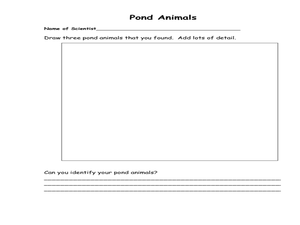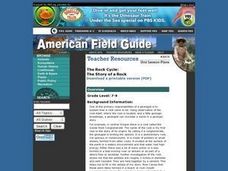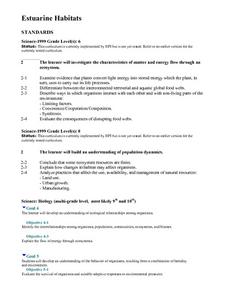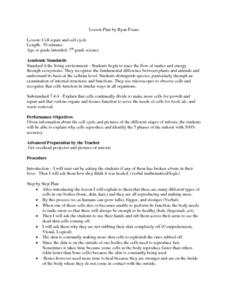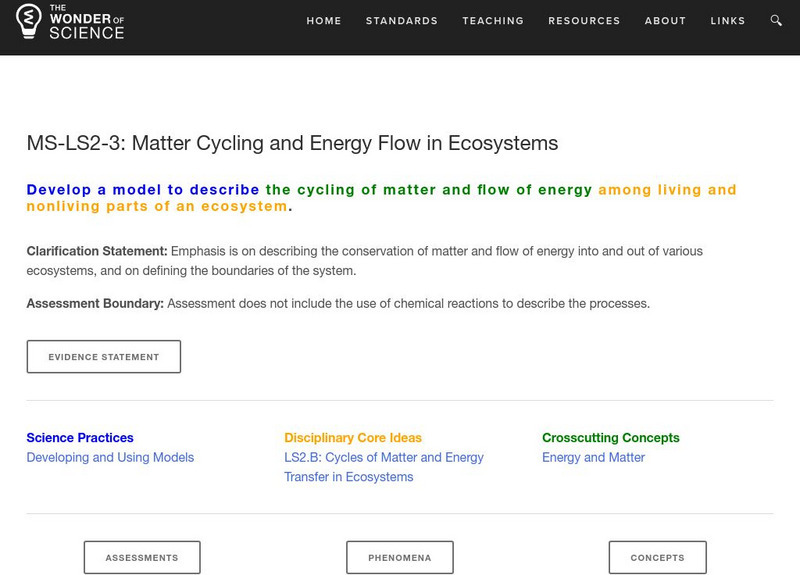Curated OER
Pond and Pond Organisms
Students explore pond ecosystems. In this pond organism activity, students will use pond water and a plastic bad in order to locate and identify freshwater organisms. The activity is designed for younger grades, but...
Curated OER
Genetic Disorders with Cultural Roots: International Insects
Students recognize that certain populations have specific genetic disorders that could benefit or harm them in their environment, work out punnett square problems and infer offspring probabilities from results, and provide advantages and...
Curated OER
Introduction to Biomes
Eighth graders identify the different kinds of biomes. In this life science lesson, 8th graders explain their importance in an ecosystem. They take a BrainPop quiz at the end of the lesson..
Curated OER
Hog Watch
Sixth graders assume the roles of the staff of an Environmental Regulatory Agency and must assess the amount of damage caused by hog factories. Working in groups, they make recommendations that will decrease the impact of hog factories...
Curated OER
Ecological Citizen
Students examine the interconnectedness of living and non-living things that constitute an ecosystem. They examine fallen trees,insects, living trees, leaves, food webs, and forests. They conduct various activities and write poems about...
Curated OER
Carbon and Oxygen Cycles
Young scholars construct their own diagrams outlining the pathway of carbon and oxygen in the atmosphere. Students explain their diagrams outlining the pathway and teacher checks for accuracy and completion.
Curated OER
Water's Edge Café
Learners observe water birds feeding at a local wetland, record what they see, and construct an appropriate menu for a "Waterfowl Cafe." They also play a "flocking" game.
Curated OER
Habitat Basics
First graders get out and explore two different habitats to examine how each one meets the needs of the plants and animals that dwell there. They discuss what they've learned about animal habitats as they explore the outdoor environment....
Curated OER
Owls: Top of a Food Chain
Although written for middle schoolers, there is no reason that a 3rd, 4th, or 5th grader could not also learn about food chains through the dissection of owl pellets. After you introduce the topic, learners complete an owl research...
Curated OER
Exploring Ecology
Students explore the basics of ecology. They discuss ecological succession, the water cycle and human impacts on the environment. Students explore the owls, succession, the human impact on the environment and complete the "Incredible...
Curated OER
Plants 'R' Us!
Students investigate the interdependencies of plants and animals, and study what a food web is. They create a food web using yarn and images.
Curated OER
Food For Thought
Students create an individual menu for one of their peers. They must examine their peer's activity level and family history.
Curated OER
Life on the Ocean Floor
Why would water 2700 meters deep suddenly become warmer? Explore this and other ocean floor discoveries through this reading response worksheet. Scholars read information about the organisms discovered by Alvin, a deep-sea submersible....
Curated OER
The Rock Cycle: The Story of a Rock
Students describe the changes undergone by rocks during the rock cycle and develop an understanding of the interconnectedness of the rock cycle.
Michigan Sea Grant
Food Chains and Webs
Starting with a simple food chain, young scientists interpret the difference and interrelatedness between herbivores, carnivores and producers. They answer questions related to cause and effect of food chain disruptions, including the...
Curated OER
Design and Construction of an Eco-House
Students are able to design, construct, evaluate and recommend materials for planned Eco-house to be built on campus. They investigate about good design and plan for construction. Students have a greater knowledge and appreciation of...
Curated OER
Estuarine Habitats
Sixth graders study the important habitats, flora, fauna, and physical factors of coastal habitats. They compare the aquatic habitats to terrestrial habitats by researching and completing tables with the information.
Curated OER
St. Andrew Bay Story
Fourth graders produce a front page newspaper story about St. Andrew Bay (Fl) after completing a field trip to St. Andrew State Park (Fl) and viewing two videos about the bay system. They use a word processing computer program to...
Curated OER
Fun Photosynthesis
Second graders, using large colored poster board, explore photosynthesis and its effect on the food chain and survival of organisms.
Curated OER
Who? Who? Whoooooooo?
Students read Poppy by Avi and then dissect an owl pellet. They complete a KWL chart and play vocabulary games to prepare for the dissection. They examine what the pellet can tell us about the owl's life.
Curated OER
Cell Repair and Cell Cycle
Seventh graders explore the cell cycle. They view pictures of different stages of mitosis and explain why cells reproduce. They identify the five phases of mitosis: interphase, prophase, metaphase, anaphase, and telophase.
The Wonder of Science
The Wonder of Science: Ms Ls2 3: Matter Cycling and Energy Flow in Ecosystems
Work samples, phenomena, assessment templates, and videos that directly address standard MS-LS2-3: matter cycling and energy flow in ecosystems.
Annenberg Foundation
Annenberg Learner: The Habitable Planet: Ecosystems: Energy Flow Through
Detailed explanation of the processes by which energy flows through an ecosystem. Scroll down and open Section 3.


